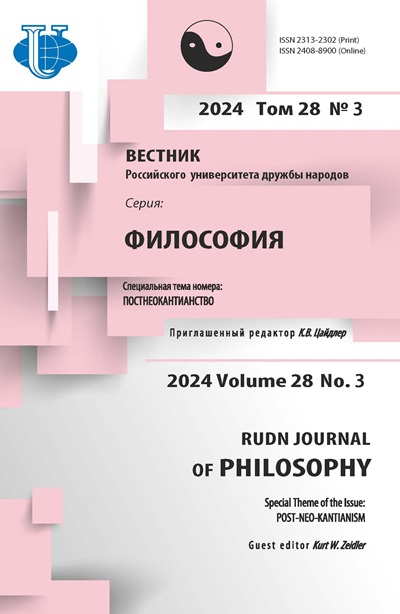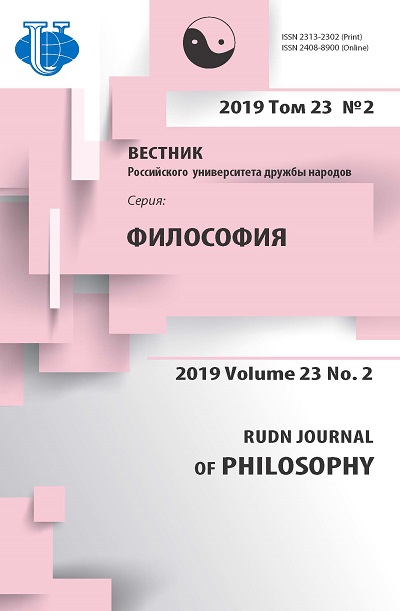Том 23, № 2 (2019)
- Год: 2019
- Статей: 10
- URL: https://journals.rudn.ru/philosophy/issue/view/1204
- DOI: https://doi.org/10.22363/2313-2302-2019-23-2
Весь выпуск
МАТЕРИАЛЫ К ПОЛНОМУ СОБРАНИЮ СОЧИНЕНИЙ В.С. СОЛОВЬЕВА
ПУТЬ В.С. СОЛОВЬЕВА К «ИСТОРИИ И БУДУЩНОСТИ ТЕОКРАТИИ»: ПОЛЕМИКА О ДОГМАТИЧЕСКОМ РАЗВИТИИ ЦЕРКВИ НА СТРАНИЦАХ ЖУРНАЛА «ВЕРА И РАЗУМ» (1884-1891)
Аннотация
Предпринимается историко-философская реконструкция полемики между В.С. Соловьевым и авторами журнала Харьковской духовной семинарии «Вера и разум», пришедшейся на «богословско-публицистический» (или «теократический») период творчества русского философа (1880-е гг.). Особое внимание уделяется спорам, которые вели с Соловьевым по поводу теории догматического развития в церкви Т. Стоянов (К.Е. Истомин), А.П. Шостьин и французский православный священник о. Владимир Гетте. В контексте данной полемики проанализированы также аргументы «в защиту» позиции Соловьева, приводившиеся на страницах журнала «Православное обозрение» богословом, последователем К.Н. Леонтьева И.И. Кристи. Показывается рецепция теократических идей Соловьева и реакция на его взгляды по церковному вопросу как в католических, так и в православных кругах российского и западного общества (в частности, идейно продолжающая полемику с авторами «Веры и разума» критика идей Соловьева на страницах французских журналов «L’Univers», «L'Union Chrétienne», «Revue d’Eglise greque-unie» и т.д.). Продемонстрирована эволюция взглядов Соловьева на проблему взаимоотношений католичества и православия, возобновления церковного общения между христианскими конфессиями, основные результаты чего нашли свое отражение в неоконченной работе мыслителя «История и будущность теократии» (Загреб, 1887). Делается вывод о поверхностности суждений большинства идейных оппонентов В.С. Соловьева, а также более поздних интерпретаторов его наследия, вслед за французским иезуитом Мишелем д’Эрбиньи пытавшихся представить его как «русского Ньюмена», перешедшего из православия в католическую веру. Показано, что разрабатывавшийся Соловьевым проект «религии Св. Духа» и создания на ее основе «Вселенской церкви» следует рассматривать прежде всего в контексте философских исканий автора, а не в связи с конфессиональными и идеологическими дивергенциями того времени.
 118-132
118-132


ИСТОРИЯ РУССКОЙ ФИЛОСОФИИ
РУССКИЙ ЕВРОПЕЕЦ Б.В. ЯКОВЕНКО
Аннотация
В статье проводится анализ творчества одного из самых известных русских неокантианцев Бориса Валентиновича Яковенко. Несмотря на то, что творчество Яковенко становится предметом анализа все большего количества исследователей как в России, так и за рубежом, системного анализа его пока не состоялось. В статье предпринимается попытка рассмотреть философское творчество русского философа системно, выявив как основные направления европейской мысли, которые оказали наибольшее влияние на позицию Яковенко, так и главные области философии, на которые были направлены усилия отечественного мыслителя. К таковым, по мнению автора статьи, относятся история философии и система так называемого трансцендентального плюрализма. Указывается на то, что история философии для Яковенко - это единый целостный процесс и потому - это история развития философских идей, а не история жизни и творчества отдельных философов. Общефилософская схема исторического развития, согласно Яковенко, выглядит так: от греческого космизма к немецкому гносеологизму и начинающемуся онтологическому повороту в современной философии. Отмечается также убеждение Б.В. Яковенко в том, что никакой национальной философии не существует. По его мнению, философия, как и наука в целом, может быть только интернациональной. Второй основной его тезис касательно развития философии состоит в том, что философия должна быть самостоятельной, независимой от других отраслей человеческого познания и знания. Она не должна быть служанкой ни богословия, ни науки. В статье приводятся также различные этапы разработки русским философом своего варианта концепции плюралистической философии. По мнению Яковенко, познать сущее как основной объект философии способна лишь плюралистическая философия.
 133-144
133-144


«ХОЧУ БЫТЬ ПРОФЕССОРОМ ФИЛОСОФИИ»... ИСТОРИЯ ОДНОГО «ПРОЕКТА» И.С. ТУРГЕНЕВА
Аннотация
Статья посвящена начальному этапу творческого пути И.С. Тургенева, когда он намеревался посвятить себя занятиям философией. В первой части историко-философского исследования представлен студенческий этап жизни, приобщение Тургенева к университетскому курсу философии сначала в Московском, затем в Петербургском университетах. В Московском университете это произошло благодаря профессору М.Г. Павлову, последователю шеллингианской философии, читавшему физику в натурфилософском формате. В Петербургском университете Тургенев слушает курс лекций по метафизике А.А. Фишера, который одним из первых приступил к чтению философии в соответствии с уваровской идеологической триадой «православие, самодержавие, народность». Во второй части рассматривается зарубежный период. Окончив курс по филологическому факультету С.-Петербургского университета в 1837 году, весной следующего года Тургенев отправляется «доучиваться» в Берлин, будучи убежденным, что в России возможно только набраться некоторых приготовительных сведений, а источник настоящего знания находится за границей. Здесь он изучал древние языки, историю, постигал философию Гегеля под руководством профессора Вердера. После прибытия в университет Шеллинга слушает его лекции и готовит для российского журнала перевод некоторых разделов его учения. Завершающая часть статьи дает представление об обстоятельствах попыток получения степени магистра, занятия кафедры философии. В начале 1842 года, предоставив диплом на степень кандидата, данный ему от Петербургского университета, Тургенев просил Совет Московского университета допустить его к испытанию на степень магистра философии, имея намерение занять пустующую здесь долгое время кафедру философии. Потерпев неудачу в Москве, отправляется в Петербург, где сдает соответствующие искомой степени экзамены. Однако не предоставив требуемую для подобной процедуры диссертацию, не получает ученую степень магистра философии и в дальнейшем целиком посвящает себя литературной деятельности, сохранив интерес к философским проблемам, которые будут решаться им уже в прозаическом формате.
 145-171
145-171


ЭЛЕКТРОННАЯ ФИЛОСОФСКАЯ ЭНЦИКЛОПЕДИЯ
СЕМЁН ЛЮДВИГОВИЧ ФРАНК: ЖИЗНЬ И УЧЕНИЕ
Аннотация
В статье рассматриваются основные биографические вехи и дается общая эволюция философских взглядов русского философа Семёна Людвиговича Франка. На начальном этапе творческого пути Франк - экономист и критический марксист. Обращение к философии в 1900-е гг. характеризуется влиянием неокантианства, имманентной философии и философии жизни. Около 1908-12 гг. происходит переход Франка на позиции метафизики и начинает формироваться его собственная философская система - абсолютный реализм. Одной из главных особенностей творчества Франка является системность. На всем своем творческом пути философ развивал, углублял и детализировал изначальную философскую интуицию - интуицию сверхрационального единства бытия, которая фиксируется уже в его ранних философских работах. Абсолютное бытие есть конкретная металогическая реальность, раскрывающаяся в живом знании. Одновременно потенциальность и трансфинитность абсолютного бытия выступает основой индивидуальности и творчества человека, источником его свободы. Философский метод Франка - рациональное постижение рационально непостижимого, основанное на принципе антиномистического монодуализма. Философия религии разворачивается как феноменологический анализ религиозного опыта. В социально-политической области Франк обосновывает позицию либерального консерватизма и христианского реализма.
 172-191
172-191


ЛЕВ ШЕСТОВ
Аннотация
Статья посвящена биографии и творчеству русского религиозного экзистенциального мыслителя Льва Шестова. В статье отражены основные этапы мировоззренческой эволюции философа: анализируются истоки его творчества, рассматривается круг мыслителей и философов, который был наиболее близок Шестову, исследуются причины трансформаций его взглядов, заставившие мыслителя преодолеть этическое и встать на путь философии трагедии и имморализма, прослеживается его творческая эволюция от народничества к ницшеанству и религиозной философии экзистенциального типа. Автор статьи анализирует, как менялось понимание Шестовым этического, его видение философии и представление о гуманизме, отношение к личности и наследию Ф. Ницше на протяжении творческого пути. В статье рассматриваются основные понятия его учения: трагедия, живой Бог, вера, разум, грех, дерзновение, «всемство», смерть, умозрение и др. Прослежена связь с европейскими интеллектуалами, оценен вклад Льва Шестова в западную культуру.
 192-209
192-209


ФИЛОСОФИЯ МИФОЛОГИИ
МИФОЛОГИЯ И ТЕОЛОГИЯ. Статья вторая
Аннотация
Понятие интерпретации (как процедуры установления значений тех абстракций, которые используются в теоретизации знания, в процессе разработки абстрактной модели предмета) применимо по отношению к любым формам знания, в том числе и к системам религиозного знания, конструирующим идеальные модели предмета религиозного почитания. Анализируются гносеологические особенности теологии как формы духовной культуры, ее становление в античной культуре. Показано, что гносеологической основой преодоления мифологического сознания выступала децентрация мышления, т.е. выработка сознанием способности при построении образа, картины мира вносить поправку на позицию субъекта, учитывать относительность той системы отсчета, с позиций которой субъект воспринимает объект и преобразовывает его операциональной системой мышления. Децентрация мышления обеспечила преодоление субъективных границ мыслительного поля, придание мышлению характер всеобщности. Исторические этапы и моменты этого процесса - трансформация мифологии в формы фольклорного творчества, мифопоэтический эпос, в формы религиозного сознания. В русле таких трансформаций архаического сознания формировались культурно-исторические предпосылки возникновения теологии. Они представлены в мифопоэтическом творчестве (Гомер, Гесиод и др.), античной мифографии, ранних традициях критико-рационалистического толкования мифа и др. Показано формирование аллегорической теологии, которая стала возможной в эпоху индивидуализации художественного творчества, когда зримым стало различие между мотивом и целью деятельности, творческим замыслом и его воплощением, образно-поэтическим и рационально-понятийным способами отражения мира, когда образ реальности и его личностный смысл стали осознаваться как разные состояния сознания. Основная функция любой теология - это интерпретация абстрактных моделей предмета религиозного почитания (воображаемого образа сверхъестественного).
 210-221
210-221


СОЦИАЛЬНАЯ ФИЛОСОФИЯ
ЯВЛЯЕТСЯ ЛИ МАРКСИЗМ ИСТОРИЧЕСКИМ МАТЕРИАЛИЗМОМ?
Аннотация
В статье доказывается, что исторический метод в марксизме не тождествен методу диалектическому. Логика истории и логика ее анализа в марксизме совпадают не всегда. Логическое тождественно историческому только в вечности, как это, собственно, и происходит в работах Г.В.Ф. Гегеля. Вечность, в которой все возможное уже случилось, не знает истории. История только там и начинается, где кончается вечность. Вот почему искусственное отождествление логического с историческим в марксизме порой приводит к фактическим ошибкам. Неудивительно, что этот тезис всегда вызывал дискуссии. Главным образом они объясняются тем, что дедуктивный диалектический метод, в котором общее всегда предшествует конкретному, является антиисторическим по своей природе. В реальной человеческой истории «всеобщее», которое является обобщением всех «общих», никак бы не могло возникнуть раньше этих последних. По этой причине реальный исторический материализм нуждается в индуктивном, а не в дедуктивном диалектическом методе познания. Только в этом случае он прекратит наконец оставаться отжившим свое советским «истматом» и станет реальной формой нового мировоззрения. По мнению автора, партийный дух советской философии во многом способствовал консервации упомянутых аномалий. Их открытое обсуждение могло бы помочь найти действительное, а не унаследованное от Гегеля соотношение логического и исторического методов в марксизме.
 222-229
222-229


ОБ ИМАГИНАТИВНОЙ СОСТАВЛЯЮЩЕЙ (ЛАТИНО)АМЕРИКАНСКОГО ИДЕНТИФИКАЦИОННОГО ДИСКУРСА
Аннотация
Открытие Америки стало одним из ключевых событий, определивших становление всемирно-исторического процесса. Однако на протяжении долгого времени это масштабное и общезначимое явление, как и само понятие, интерпретировалось строго в соответствии с установками и оценками, выработанными Европой, ее представлениями о том, что есть история. В европейской оптике неоднозначное и неоднородное по своему содержанию явление, сопровождающееся противоречиями, получало преломление в узко географическом, политическом, экономическом и гносеологическом ракурсах. Сложившееся таким образом традиционное толкование не принимало во внимание его историко-культурный, философский и культурологический смыслы. В статье предпринимается попытка восполнить утраченные смыслы и расширить значение понятия «Открытие Америки» путем смены перспектив - с европейской на (латино)американскую, в которой оно, определив стратегию культуротворческих процессов на континенте и став способным вобрать в себя многие смыслы самоидентификации субъекта, вовлеченного во всемирную историю, вышло на новый интерпретативный уровень.
 230-239
230-239


ДИСКУССИОННАЯ ПЛОЩАДКА
РЕЦЕПЦИЯ ЭТИКИ ДИСКУРСА В СОВРЕМЕННОЙ ФИЛОСОФИИ
Аннотация
В статье анализируются теоретические основы современного проекта рациональной этики, в котором этика дискурса воспринимается в качестве критики общества и критики современной морали. И. Кант одним из первых предлагает возможность обобщения норм морали и восприятия этики как трансцендентальной критики морали. Неокантианство развивает этику в качестве важнейшей части философской системы и фиксирует ее область действия идеалистической теорией нравственности (Г. Коген, П. Наторп). В отечественной философии современная этика воспринимается как нормативная теория, имеющая отношение к вопросам самоопределения, моральной регуляции и свободы выбора. Истоки возникновения этики дискурса в философии XX века восходят к «прагматическому повороту» и к бурным дискуссиям вокруг герменевтики языка и его априорного статуса в немецкой философии и в аналитической философии относительно понимания метаэтики. Современный проект этики дискурса обосновывается как программа, ориентированная на возможность развития моральной аргументации в социальной философии Ю. Хабермаса и в трансцендентальной прагматике К.-О. Апеля. Этика дискурса в качестве критики моральной аргументации связана с дорефлексивным горизонтом жизненного мира, отчего она есть деонтологическая, формалистическая и универсальная этика. Два значимых проекта этики дискурса, представленные в статье в качестве анализа, следует определить как «слабый и сильный» варианты философского трансцендентального идеализма в современной науке.
 240-252
240-252


НАУЧНЫЕ ОБЗОРЫ
 253-257
253-257
















